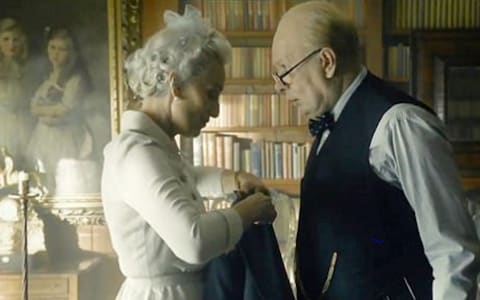 Gary Oldman turns in a career topping performance as the embattled Prime Minister Winston Churchill, trying to salvage the United Kingdom from defeat by Hitler in the first months of his term.
Gary Oldman turns in a career topping performance as the embattled Prime Minister Winston Churchill, trying to salvage the United Kingdom from defeat by Hitler in the first months of his term.
There have been three films this year featuring the rescue of British troops from Dunkirk, and two about Winston Churchill. I’m not sure why this would be, but I do think there’s a need to look back fondly on a time when leaders and nations could be brave and noble. The newest of this group is a movie called Darkest Hour—it combines the two themes into one, and despite some tinkering with the facts, is a rousing entertainment.
Darkest Hour depicts the perilous first month, in May 1940, of Winston Churchill’s first term as the British Prime Minister. The previous PM, Neville Chamberlain, has lost the confidence of Parliament after his attempt to appease Adolf Hitler has spectacularly failed. Hitler has now invaded Poland, Holland, and Belgium; and is poised to invade France. The Tories decide, reluctantly, to put Churchill forward as Chamberlain’s replacement, because he’s the only man the opposition will accept. He is, however, considered unstable and possibly incompetent by his own party, having more than a few failures on his record from previous positions in which he served. As he takes office, he faces a challenge that would daunt any man. The Germans quickly overpower the French, and 400,000 British troops sent to aid them, the bulk of the army, are cut off and have to flee to the coastal town of Dunkirk, where it looks like they will we wiped out unless some way is found to evacuate them.
Gary Oldman plays Churchill, and it’s one of those masterful performances that sweeps everything else before it. Oldman is from the grand tradition of English acting in which the performer disappears into the role. And in his career he’s played everyone from Beethoven to Dracula and Lee Harvey Oswald. Here he’s aided by a truly remarkable make-up job, which transforms, as if by magic, his lean physique into the large jowled, overweight Churchill. But this is more than an impersonation—Oldman embodies this famous leader from the inside out, letting us see especially the fine differences between the private Churchill and his deliberately crafted public persona.
The film is written by Anthony McCarten, and the director is Joe Wright, whose previous work has displayed a lush style and some thematic risk-taking. In this, his first picture based on true events, he reins his extravagance in a bit, but still displays some stirring visual flourishes. There are a few shots of the trapped army, often from above, but most of the film takes place in London, in the dark halls of Westminster and the War Office. Wright often frames Churchill against a background of darkness—there’s a feeling of pressure and isolation, of events closing in on him.
We witness much of Darkest Hour through the eyes of Churchill’s new secretary, Elizabeth Layton, played by Lily James. Kristen Scott Thomas charms in her all too brief scenes as the Prime Minister’s wife, Clementine, and Ben Mendelsohn has an interesting take on the stiff King George VI.
The film is thankfully not worshipful towards Churchill. In fact, it may be a surprise to learn how unpopular he was at first. Much dramatic tension hinges on his conservative colleagues’ desire to make a peace deal with Hitler, and Churchill’s resistance to that makes him seem insane to them. One of the virtues of the picture is that it communicates how frightening and uncertain the prospects were in 1940. Even though we know the outcome, there is still a great deal of tension.
Oldman reflects his character’s private doubts and insecurities—Churchill was a heavy drinker, impulsive and irascible as well—and it is this portrayal of the man’s serious flaws that make the drama so effective. Wright and McCarten do invent some things, including an amusing excursion by the Prime Minister into the London underground (its subway), but nothing violates one’s overall sense of historical reality. Most of all, Gary Oldman pulls us into Darkest Hour with his magnificent energy and skill.

An ambitious young man from a lower caste seeks to prosper by attaching himself to a corrupt businessman and his family, in this thriller...

Alfred Hitchcock made this appeal to join the fight against Hitler a year before the attack on Pearl Harbor. Now this film is valued...

A charismatic but demanding gay man starts an affair with a woman, while trying to hang on to his husband. American director Ira Sachs...